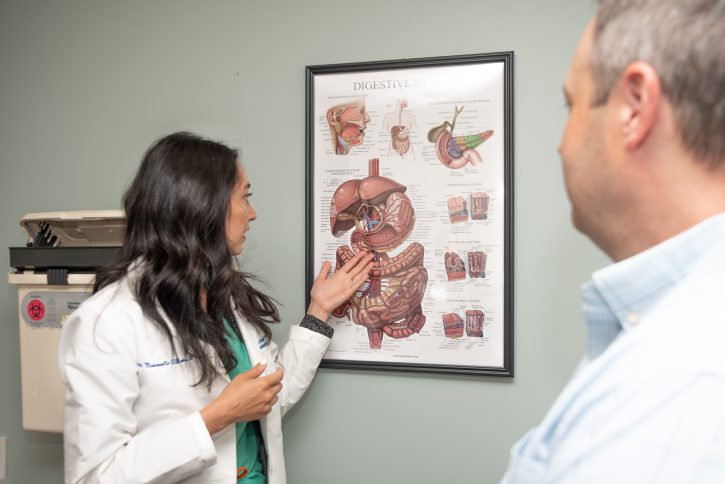
Originally posted February 2024
Combatting Colonoscopy Fears
March is colorectal cancer awareness month and while we all know how important colonoscopies are when it comes to early cancer detection, let’s face it – no one looks forward to getting one. From the dreaded prep work to the fear of a cancer diagnosis, colonoscopies can stir up a lot of anxiety. If you have been putting yours off or are preparing to have one for the first time, keep reading. Colonoscopies aren’t as frightening as you may think – and they can save your life.
Let’s start with the prep work.
For your provider to get a good look at the inside of your colon, you will need to clean it out one day prior to your procedure. Most patients are directed to drink a liquid laxative that will cause diarrhea. In addition, you will be unable to eat solid foods for a day, and may be asked to stop taking certain medications. “It can be intimidating to have to ‘prep,’ but it only lasts for a short time and it is a very important piece of getting a high-quality examination,” said Dr. Isabel Manzanillo-DeVore of Fairfield Healthcare Professionals Gastroenterology.
If you’re still feeling anxious, Dr. Manzanillo-DeVore recommends you put the process into perspective. “I tell patients that a colonoscopy preparation is a thousand percent less traumatic and painful than colorectal cancer, which is the third most common cancer worldwide,” she said.
What is the procedure like? Will it hurt?
During a colonoscopy, which typically takes 30-60 minutes, the provider inserts a flexible, lighted tube into your rectum and colon to look for signs of cancer, like polyps or bleeding. The good news is you won’t be awake for it and should feel no discomfort. “During the procedure, we use CO2 gas to better evaluate the colon, which dissolves quickly and does not lead to a bloated sensation,” Dr. Manzanillo-DeVore explained. “The vast majority of people feel well-rested afterwards.”
She added that extra steps are taken during the procedure to ensure patient privacy and comfort. “We keep ‘exposure’ of patients to a minimum, and they have a hospital gown and drape in place the entire time,” she said.
I know a colonoscopy is the best way to find cancer, but that’s my concern – what if they do find something?
It’s natural to feel worried about a cancer diagnosis following a colonoscopy. Staying up-to-date on your screenings can help relieve that tension. If your provider does find benign or small precancerous polyps, they can be removed during your colonoscopy. The last thing you want to do is let them go undetected. “It can take up to 10 years for a polyp to progress into cancer, but family history, diet, lifestyle, smoking and alcohol use can all influence that progression,” Dr. Manzanillo-DeVore said.
Polyps usually cause little to no symptoms, so it’s important to get screened even if you are feeling well. Symptoms such as change in bowel habits, rectal bleeding or stomach pain often don’t appear until colorectal cancer is in a more advanced stage. Talk to your provider to find out when you should start getting a colonoscopy and how frequently. “The current guideline is to start screening at age 45, but you may need to start earlier if there is appropriate family history of colorectal cancer or advanced colon polyps,” Dr. Manzanillo-DeVore said.
Dr. Isabel Manzanillo-DeVore and Dr. Seth Levin of FHP Gastroenterology are dedicated to providing patients with the specialty care they need – including colonoscopies – right here in Lancaster. To learn more, call the office at 740-687-9182.